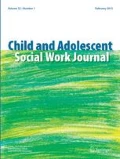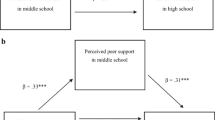Abstract
This study examines the influence of adult and peer support on the psychological well-being of middle-school students. Using data representing 13,843 middle-school students from seven U.S. states, which were collected with the School Success Profile, hierarchical regression analysis is used to examine a hypothesis in 2 models of relationships: continuity/cognitive and compensatory/competition. Results support the continuity/cognitive model, and indicate peer support is an important contributor to middle-school students’ psychological well-being at various levels of adult support. When adult support is low, high levels of peer support do not improve psychological well-being. Implications for research and practice are discussed.

Similar content being viewed by others
References
Allison, P. D. (2002). Missing data. Thousand Oaks, CA: Sage Publications.
Baron, R. M., & Kenny, D. A. (1986). The moderator–mediator variable distinction in social psychological research: Conceptual, strategic, and statistical considerations. Journal of Personality and Social Psychology, 51, 1173–1182. doi:10.1037/0022-3514.51.6.1173.
Bowen, G. L., & Richman, J. M. (2001). School success profile. Chapel Hill, NC: Jordan Institute for Families, School of Social Work, The University of North Carolina at Chapel Hill.
Bowen, G., Rose, R., & Bowen, N. (2005). The reliability and validity of the school success profile. Philadelphia, PA: Xlibris.
Brewster, A. B., & Bowen, G. L. (2004). Teacher support and the school engagement of Latino middle and high school students at risk for failure. Child and Adolescent Social Work Journal, 21, 47–67. doi:10.1023/B:CASW.0000012348.83939.6b.
Cohen, S., Gottlieb, B. H., & Underwood, L. G. (2000). Social relationships and health. In S. Cohen, L. G. Underwood & B. H. Gottlieb (Eds.), Social support measurement and evaluation (pp. 3–25). New York: Oxford University Press.
Cooper, C. R., & Cooper, R. G. (1992). Links between adolescents’ relationships with their parents and peers: Models, evidence, and mechanisms. In R. D. Parke & G. W. Ladd (Eds.), Family-peer relationships: Modes of linkage (pp. 135–158). Hillsdale, NJ: Lawrence Erlbaum Associates, Inc.
Demaray, M. K., & Malecki, C. K. (2002). The relationships between perceived social support and maladjustment for students at risk. Psychology in the Schools, 39, 305–316. doi:10.1002/pits.10018.
Demaray, M. K., Malecki, C. K., Davidson, L. M., Hodgson, K. K., & Rebus, R. J. (2005). The relationship between social support and student adjustment: A longitudinal analysis. Psychology in the Schools, 42, 691–706. doi:10.1002/pits.20120.
Flook, L., Repetti, R. L., & Ullman, J. B. (2005). Classroom social experiences as predictors of academic performance. Developmental Psychology, 41, 319–327. doi:10.1037/0012-1649.41.2.319.
Garcia-Reid, P. (2007). Examining social capital as a mechanism for improving school engagement among low income Hispanic girls. Youth & Society, 39, 164–181. doi:10.1177/0044118X07303263.
Gonzales, N. A., Cauce, A. M., Friedman, R. J., & Mason, C. A. (1996). Family, peer, and neighborhood influences on academic achievement among African-American adolescents: One-year prospective effects. American Journal of Community Psychology, 24, 365–387. doi:10.1007/BF02512027.
Greene, M. L., & Way, N. (2005). Self-esteem trajectories among ethnic minority adolescents: A growth curve analysis of the patterns and predictors of change. Journal of Research on Adolescence, 15, 151–177. doi:10.1111/j.1532-7795.2005.00090.x.
Laible, D. J., Carlo, G., & Raffaelli, M. (2000). The differential relations of parent and peer attachment to adolescent psychological adjustment. Journal of Youth and Adolescence, 29, 45–59. doi:10.1023/A:1005169004882.
Levitt, M. J., Levitt, J., Bustos, G. L., Crooks, N. A., Santos, J. D., Telan, P., et al. (2005). Patterns of social support in the middle childhood to early adolescent transition: Implication for adjustment. Social Development, 14, 398–420. doi:10.1111/j.1467-9507.2005.00308.x.
Little, R. J. A. (1988). A test of missing completely at random for multivariate data with missing values. Journal of the American Statistical Association, 83, 1198–1202. doi:10.2307/2290157.
Maddox, S. J., & Prinz, R. J. (2003). School bonding in children and adolescents: Conceptualization, assessment, and associated variables. Clinical Child and Family Psychology Review, 6, 31–49. doi:10.1023/A:1022214022478.
Malecki, C. K., & Demaray, M. K. (2002). Measuring perceived social support: Development of the child and adolescent social support scale (CASSS). Psychology in the Schools, 39, 1–18. doi:10.1002/pits.10004.
Nickerson, A. B., & Nagle, R. J. (2005). Parent and peer attachment in late childhood and early adolescence. The Journal of Early Adolescence, 25, 223–249. doi:10.1177/0272431604274174.
Park, N., & Huebner, E. S. (2005). A cross-cultural study of the levels and correlates of life satisfaction among adolescents. Journal of Cross-Cultural Psychology, 36, 444–456. doi:10.1177/0022022105275961.
Pretty, G. M. H., Andrewes, L., & Collett, C. (1994). Exploring adolescents’ sense of community and its relationship to loneliness. Journal of Community Psychology, 22, 346–358. doi :10.1002/1520-6629(199410)22:4<346::AID-JCOP2290220407>3.0.CO;2-J.
Pretty, G. M. H., Conroy, C., Dugay, J., Fowler, K., & Williams, D. (1996). Sense of community and its relevance to adolescents of all ages. Journal of Community Psychology, 24, 365–379. doi :10.1002/(SICI)1520-6629(199610)24:4<365::AID-JCOP6>3.0.CO;2-T.
Raja, S. N., McGee, R., & Stanton, W. R. (1992). Perceived attachments to parents and peers and psychological well-being in adolescence. Journal of Youth and Adolescence, 21, 471–485. doi:10.1007/BF01537898.
Richman, J. M., Bowen, G. L., & Woolley, M. E. (2004). School failure: An eco-interactional developmental perspective. In M. W. Fraser (Ed.), Risk and resilience in childhood: An ecological approach (pp. 133–155). Washington, DC: NASW Press.
Roeser, R. W., & Eccles, J. S. (1998). Adolescents’ perceptions of middle school: Relation to longitudinal changes in academic and psychological adjustment. Journal of Research on Adolescence, 8, 123–158. doi:10.1207/s15327795jra0801_6.
Roeser, R. W., Eccles, J. S., & Sameroff, A. J. (1998). Academic and emotional functioning in early adolescence: Longitudinal relations, patterns, and prediction by experience in middle school. Development and Psychopathology, 10, 321–352. doi:10.1017/S0954579498001631.
Scales, P. C., Benson, P. L., & Mannes, M. (2006). The contribution to adolescent well-being made by nonfamily adults: An examination of developmental assets as contexts and processes. Journal of Community Psychology, 34, 401–413. doi:10.1002/jcop.20106.
Schafer, J. L., & Graham, J. W. (2002). Missing data: Our view of the state of the art. Psychological Methods, 7, 147–177. doi:10.1037/1082-989X.7.2.147.
Smith, E. P., Atkins, J., & Connell, C. M. (2003). Family, school, and community factors and relationships to racial-ethnic attitudes and academic achievement. American Journal of Community Psychology, 32, 159–173. doi:10.1023/A:1025663311100.
Tourville, J. N., & Bowen, G. L. (1994). The quality of the parent–child relationship and adolescents’ willingness to turn to same-sexed peers for help in times of distress. Journal of Social Behavior and Personality, 9, 259–269.
Vedder, P., Boekaerts, M., & Seegers, G. (2005). Perceived social support and well-being in school: The role of students’ ethnicity. Journal of Youth and Adolescence, 34, 269–278. doi:10.1007/s10964-005-4313-4.
Walters, K., & Bowen, G. L. (1997). Peer group acceptance and academic performance among adolescents participating in a dropout prevention program. Child and Adolescent Social Work Journal, 14, 413–426. doi:10.1023/A:1024566930164.
Way, N., & Robinson, M. G. (2003). A longitudinal study of the effects of family, friends, and school experiences on the psychological adjustment of ethnic minority, low-SES adolescents. Journal of Adolescent Research, 18, 324–346. doi:10.1177/0743558403018004001.
Wentzel, K. R. (1998). Social relationships and motivation in middle school: The role of parents, teachers, and peers. Journal of Educational Psychology, 90, 202–209. doi:10.1037/0022-0663.90.2.202.
Wentzel, K. R., Barry, C. M., & Caldwell, K. A. (2004). Friendships in middle school: Influences on motivation and school adjustment. Journal of Educational Psychology, 96, 195–203. doi:10.1037/0022-0663.96.2.195.
Wentzel, K. R., & Caldwell, K. A. (1997). Friendships, peer acceptance, and group memberships: Relations to academic achievement in middle school. Journal of Educational Psychology, 90, 202–209. doi:10.1037/0022-0663.90.2.202.
Wentzel, K. R., & McNamara, C. C. (1999). Interpersonal relationships, emotional distress, and prosocial behavior in middle school. The Journal of Early Adolescence, 19, 114–125. doi:10.1177/0272431699019001006.
Wentzel, K. R., & Watkins, D. E. (2002). Peer relationships and collaborative learning as contexts for academic enablers. School Psychology Review, 31, 366–377.
Wilkinson, R. B. (2004). The role of parental and peer attachment in the psychological health and self-esteem of adolescents. Journal of Youth and Adolescence, 33, 479–493. doi:10.1023/B:JOYO.0000048063.59425.20.
Wills, T. A., & Shinar, O. (2000). Measuring perceived and received social support. In S. Cohen, L. G. Underwood, & B. H. Gottlieb (Eds.), Social support measurement and evaluation (pp. 3–25). New York: Oxford University Press.
Author information
Authors and Affiliations
Corresponding author
Rights and permissions
About this article
Cite this article
Buchanan, R.L., Bowen, G.L. In the Context of Adult Support: The Influence of Peer Support on the Psychological Well-Being of Middle-School Students. Child Adolesc Soc Work J 25, 397–407 (2008). https://doi.org/10.1007/s10560-008-0143-z
Received:
Accepted:
Published:
Issue Date:
DOI: https://doi.org/10.1007/s10560-008-0143-z




